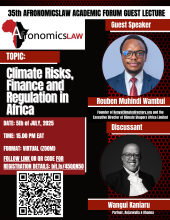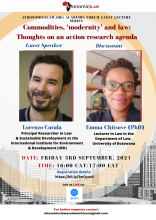35th Afronomicslaw Academic Forum Guest Lecture - Climate Risks, Finance and Regulation in Africa
This lecture will explore the interlink of climate risks, financial regulation, and sustainable finance, drawing on insights from my advisory work with central banks, financial institutions, and UN agencies, and from my teaching roles at University of Cape Town and Strathmore Business School. The lecture will examine how climate risks affect macroeconomic shocks and explore Africa's evolving climate-related regulatory landscape, including prudential frameworks and disclosure requirements. We will explore recent developments, including new reporting standards, innovative finance products, carbon market regulations, and green finance taxonomies.

